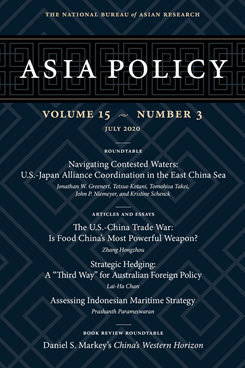U.S.-Japan Coordination in an East China Sea Crisis
This essay examines Japan’s crisis-management system and security-related coordination with the U.S. in the case of an East China Sea or Senkaku Islands gray-zone scenario and offers a recommendation for possible improvement.
Executive Summary
MAIN ARGUMENT
Provocative actions involving the Senkaku Islands could generate a quickly evolving and complex crisis that would require close and agile coordination between Japan and the U.S. Numerous and various government entities would become involved and events may occur dynamically, which in turn could challenge the effectiveness of the existing peacetime coordination mechanism between Japan’s Self-Defense Forces and the U.S. military. This essay proposes the establishment of a Standing Bilateral Joint Task Force as a possible way to strengthen U.S.-Japan defense-related coordination and improve both sides’ capabilities to respond and contribute to whole-of-government crisis management.
POLICY IMPLICATIONS
- Opinions on China’s real intentions for the East China Sea and Senkaku Islands range from possible invasion and occupation of the islands to a decades-long stand-off and waiting game. A related and key issue is how an East China Sea crisis might affect or involve Taiwan.
- In a Senkaku Islands crisis, it is important to determine whether there would be certain trigger events to cause Japan and the U.S. to initiate crisis-management coordination, and whether such events could be determined in advance.
- Given U.S. commitments in its security treaty with Japan, both governments and militaries should clearly define what governmental and political processes might be pursued to activate Article 5 in response to a defense scenario involving Japanese islands in the East China Sea.
John P. Niemeyer is a U.S. Navy veteran and retired U.S. government civilian with over 35 years of work experience in Japan. From 1999 to 2017, he served as a political adviser and interpreter for the commander of the U.S. Naval Forces Japan. He currently resides in Yokosuka, Japan.
About Asia Policy
Asia Policy is a peer-reviewed scholarly journal presenting policy-relevant academic research on the Asia-Pacific that draws clear and concise conclusions useful to today’s policymakers. Asia Policy is published quarterly in January, April, July, and October and accepts submissions on a rolling basis. Learn more


